Search the Special Collections and Archives Portal
Search Results
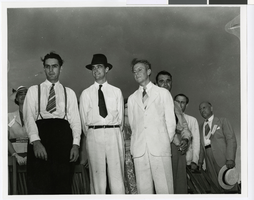
Photograph of Howard Hughes, Ed Lund, and Harry Connor, Houston, Texas July 30, 1938
Date
1938-07-30
Archival Collection
Description
Howard Hughes standing with others in Houston, Texas, during a celebration of his around-the-world event.
Image

Photograph of Howard Hughes, circa 1938
Date
1938
Archival Collection
Description
A close up portrait of Howard Hughes, possibly in an airplane hangar in New York.
Image
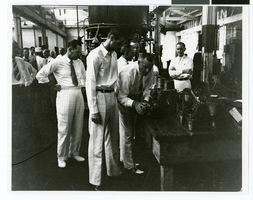
Photograph of Howard Hughes visiting the Hughes Tool Company, Houston, Texas, July 30, 1938
Date
1938-07-30
Archival Collection
Description
Howard Hughes (foreground) and S. P. Brown (bending over) examining the new Hughes rock bit head at the Hughes Tool Company plant.
Image
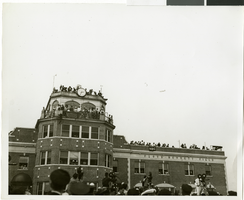
Photograph of a crowd awaiting the arrival of Howard Hughes, New York, July 14, 1938
Date
1938-07-14
Archival Collection
Description
The black and white view of a crowd of people awaiting the arrival of Howard Hughes in his Lockheed 14 aircraft at Floyd Bennett Airport, New York. This final landing for Hughes marked the end of his Round The World flight.
Image
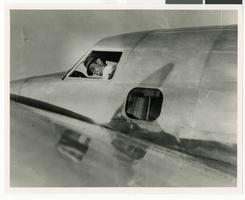
Photograph of Howard Hughes in the cockpit of a Lockheed-14 plane, New York, July 10, 1938
Date
1938-07-10
Archival Collection
Description
Howard Hughes in cockpit of Lockheed-14 before take-off from Floyd Bennet Field in New York.
Image

Photograph of a grinding slab metate at the Lost City, Clark County, before 1938
Date
1930 to 1938
Archival Collection
Description
Grinding slab metate at the Lost City with numerous holes
Transcribed Notes: Notes on photo sleeve Los City, Nevada. Holes and stones were used to grind grains, etc. (Credit: W.A. Davis); 'Gypsum Cave, bedrock mortars near cave' - W.A. Davis
Image
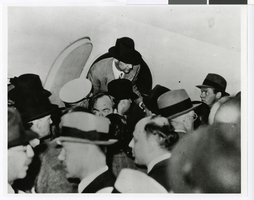
Photograph of Howard Hughes exiting the Lockheed-14 at the Floyd Bennett Airport, New York, July 14, 1938
Date
1938-07-14
Archival Collection
Description
Howard Hughes getting out of cabin door of Lockheed-14 at the Floyd Bennett Airport in New York in 1938.
Image
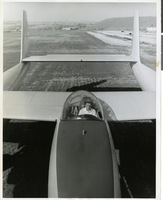
Photograph of Howard Hughes sitting in the cockpit of the XF-11 preparing for his first test flight in Culver City, California July 7, 1947
Date
1947
Archival Collection
Description
Transcribed from press release attached to back of photo: "NEW PHOTO PLANE TEST-FLOWN CULVER CITY, California, July 7 -- Howard Hughes, who designed and built the new FX-11 reconnaissance plane in conjunction with Air Materiel Command engineers, sits in the pilot's bubble-glass canopy preparing for the first test flight. One of the world's fastest long-range photo planes, the XF-11 can attain a speed of more than 400 miles per hour, Army officials said. It is powered by two 3000-horsepower radial engines with eight-bladed contra-rotating propellers. Outstanding features include a full-span flap, unique eight-camera layout, and exceptionally fast take-off." Transcribed from photo sleeve: "Howard Hughes sits in the cockpit of the XF-11, a reconnaissance plane that Hughes built and designed in conjunction with Air Materiel Command engineers. Hughes is preparing for his first test flight in Culver City, California July 7, 1947.
Image
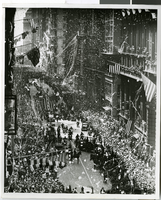
Photograph of Howard Hughes and his crew at a parade, New York, July 15, 1938
Date
1938-07-15
Archival Collection
Description
The black and white view of Howard Hughes and his crew at a parade after he completed his Round-The-World flight in New York. Handwritten on the back of the image: "B' way parade temporarily blocked by fire engines answering false alarm. 7/15/38."
Image
Hoover Dam Service Bureau and Boulder City Theatre on Arizona Street in Boulder City, Nevada, approximately 1936-1938
Level of Description
File
Archival Collection
L. F. Manis Photograph Collection
To request this item in person:
Collection Number: PH-00100
Collection Name: L. F. Manis Photograph Collection
Box/Folder: Folder 15
Collection Name: L. F. Manis Photograph Collection
Box/Folder: Folder 15
Archival Component
Pagination
Refine my results
Content Type
Creator or Contributor
Subject
Archival Collection
Digital Project
Resource Type
Year
Material Type
Place
Language
Records Classification
